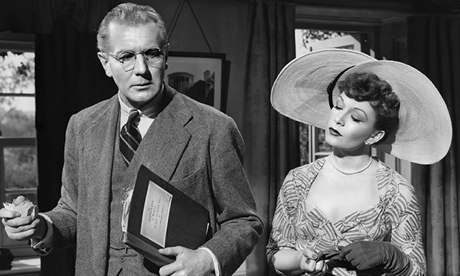
Jean Kent, the fiery, sexy, red-haired bad girl of British movies in the 1940s, who has died aged 92, was a fine actor, and clearly enjoyed life, her work and – while it lasted – her cinema fame. While never a top star, she gained a considerable following, and from the 1960s appeared regularly on television. Her film breakthrough came as a result of stage work: after the revue Apple Sauce, starring Vera Lynn and Max Miller, reached the London Palladium in 1941, she was offered a long-term contract, and the first of her Gainsborough Pictures appearances came in It's That Man Again (1943), with another wartime entertainer, the radio comic Tommy Handley.
It took another four films for her to make her first real mark as Lucy, the friend of Phyllis Calvert in the title role of the melodrama Fanny By Gaslight, directed by Anthony Asquith. By the end of it she was a dancer in Paris, and in Two Thousand Women (1944) her role as a stripper who ends up in a German internment camp for women gave her a further chance to act, as did, in a more domestic setting, Waterloo Road (1945).
In The Wicked Lady (also 1945), Margaret Lockwood fell for the highwayman – James Mason – whom she was impersonating; Kent played his other love interest. It was a role that she took over during shooting from Valerie White, who developed appendicitis, which explains why Kent is not shown in the closing cast lists on some prints.
Her first starring role came as the Gypsy Rosal alongside Stewart Granger in Caravan (1946). During the filming of it she met the actor Jusuf Ramart, and they married shortly before its release.
Along with Fanny By Gaslight, one of her favourite films was Good-Time Girl (1948). This took the flair she had developed for playing the "bad girl" away from the fantasy of the costume melodramas to the realism of a teenager, Gwen Rawlings, with family problems. She is drawn inexorably into a downward spiral of criminality that includes the killing of a policeman in a drunk driving incident.
Despite being in her late 20s, Kent played the role effectively: the backdrop to her troubles is a criminal justice system that operates by the rules, but can offer her no positive help. The whole is presented as an exemplary tale to a runaway played by a true teenager – the young Diana Dors.
Another favourite of Kent's was Trottie True (1948). Like Champagne Charlie (1944), with Tommy Trinder and Stanley Holloway, it was a music-hall story, with Kent as a Gaiety Girl, a star of the musical comedy in vogue in the Edwardian era, who has several suitors.
Much less glamorously, in The Woman in Question (1950) she played a murdered fortune teller whose life is told in flashback from five different points of view. Then she and Michael Redgrave were Andrew and Millie Crocker-Harris in The Browning Version (1951). In Asquith's realisation of Terence Rattigan's play, he is the stuffy, old-fashioned classics teacher, she the wife who embarks on an affair with his younger colleague Frank Hunter (Nigel Patrick).
She was born Joan Summerfield in Brixton, south London, to Nina Norre, a ballet dancer, and a music-hall harpist whose stage name was Norman Field; Jean herself had the stage names Peggy Summers and Jean Carr before settling on Jean Kent for It's That Man Again. She was educated at a convent school, which she left early because of ill-health.
After travelling with her parents, who were touring with a theatre company, she trained at a dance school, and in 1933 appeared at the Theatre Royal, Bath, replacing her mother, who had had an accident. By 1935 she was a chorus girl and soubrette at the Windmill theatre, in London. Three years later, the director, Vivian Van Damm, fired her – "because I thought that she lacked personality" – so she left London to work in repertory and improve it.
She made a few minor film appearances in the 1930s, but once her cinema career was properly under way, she quickly became very popular, and her fan club – run by her mother, who ran all her business affairs – grew rapidly. In the 1950s she made few films and returned to the stage, admitting that she preferred working in theatre, and lamenting how she was "plagued in a way with this curious costume-picture image". She regretted not being offered the part of Alice in the 1959 film Room at the Top, while recognising that Simone Signoret was a fine actor. Nonetheless, Kent felt that the character was supposed to be British: "It was this old English thing that only foreigners have sex appeal. They'd forgotten me by that time, you see, they'd forgotten that I was supposed to be the sexy girl in the movies."
From 1960 she worked in stage productions including The Lady's Not for Burning, The Merchant of Venice, The Rivals and Lock Up Your Daughters. In 1973 she took over the role of Eleanor Hunter in No Sex Please – We're British in the West End. On television, she was Queen Elizabeth I in Sir Francis Drake (1962) and made many passing appearances, among them in Up Pompeii (1970), Crossroads (1981) and Lovejoy (1991).
Her husband, who later changed his surname to Hurst, died in 1989.
• Jean Kent (Joan Mildred Summerfield), actor, born 29 June 1921; died 30 November 2013
• Sheila Whitaker died earlier this year
• This article was amended on 1 December. Kent's first name at birth was Joan rather than Jean.

